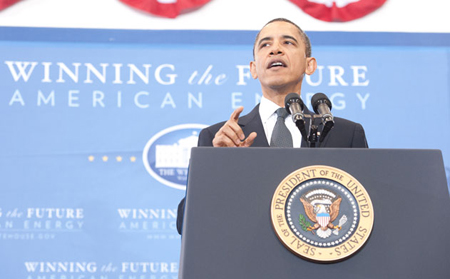[Editor’s Note: In our latest column, we are publishing a cross post from the Environmental Defense Fund regarding President Obama’s speech on energy security he gave last week. The author of this cross post is EDF’s Elgie Holstein.]
On Wednesday, President Obama, speaking at Georgetown University, set out a multi-pronged approach to boosting America’s energy security. We agree that America “cannot keep going from shock to trance on the issue of energy security, rushing to propose action when gas prices rise, then hitting the snooze button when they fall again.” President Obama’s goals to leverage alternative fuels, increase efficiency, and invest in smart grid technology, advanced vehicles, high speed rail, and public transit are critical steps toward a truly clean energy economy.
The core objectives of our Energy Program are to help accelerate the deployment of large-scale, clean technologies into the nation’s energy system and remake the market for efficiency and innovation. Our goal is to reduce the environmental impact of energy production, delivery, and use. Why? Because investments in clean technology will bring about the clean energy revolution we need by greatly reducing our use of dirty fuels and improving air quality and, thus, the health of millions of Americans – especially children and the elderly.

We can improve our energy independence and end the economic hardships imposed on American families by spiking energy costs while preserving our air, land, and water for future generations.
As important as the energy, environmental, and public health outcomes are, this revolution also benefits our economy and creates jobs. American workers have tremendous opportunities related to energy efficient and clean technologies, which are creating well-paying jobs and helping companies compete in the global market.
One of EDF’s main areas of focus is on smart grid technology. President Obama’s Advanced Research Projects Agency-Energy (ARPA-E) funds projects that will help modernize our antiquated electricity system. A smarter grid can adjust demand, reducing the need to build costly, new power plants. It will enable extensive new wind and solar energy to integrate into an upgraded grid so that we can rely far more on clean, renewable, home-grown energy. The result: less environmental damage, more jobs, and a more efficient, reliable, and resilient electricity system. A smart grid will also facilitate the switch to electric vehicles, making it possible to “smart charge” them at night so they can be ready the next morning for commuters who will no longer be paying for gasoline.
Another key point that the President made was on responsible development practices for natural gas. Natural gas can play a significant role in achieving our clean energy future – but it needs to be developed safely and in an environmentally sound manner. Protecting citizens’ health and the environment will require that we “get it right from the start.” That means putting rules in place to guarantee that our water and land are protected from contamination and ensuring that leakage of harmful air pollution is minimized.
The President’s call for increased transparency in the use of hydraulic fracturing chemicals is a necessity. The natural gas industry is engaged in a public perception war that it is not winning. Participating in the development of transparency within the industry is the first step necessary in attempting to rebuild public trust. A balance between creating a sustainable market for business and ensuring the health and safety of the public should not be a source of division, but instead our common ground.
While Congress is negotiating the federal budget, members would do well to recognize the essential need to make long-term investments in a 21st century clean energy economy that will reduce America’s dependence on foreign oil and put Americans back to work.
EDF commends the President for his willingness to look to the future. If we can do that, we will all benefit from a stronger economy, energy security, and a cleaner environment that protects our public health and maintains our quality of life.